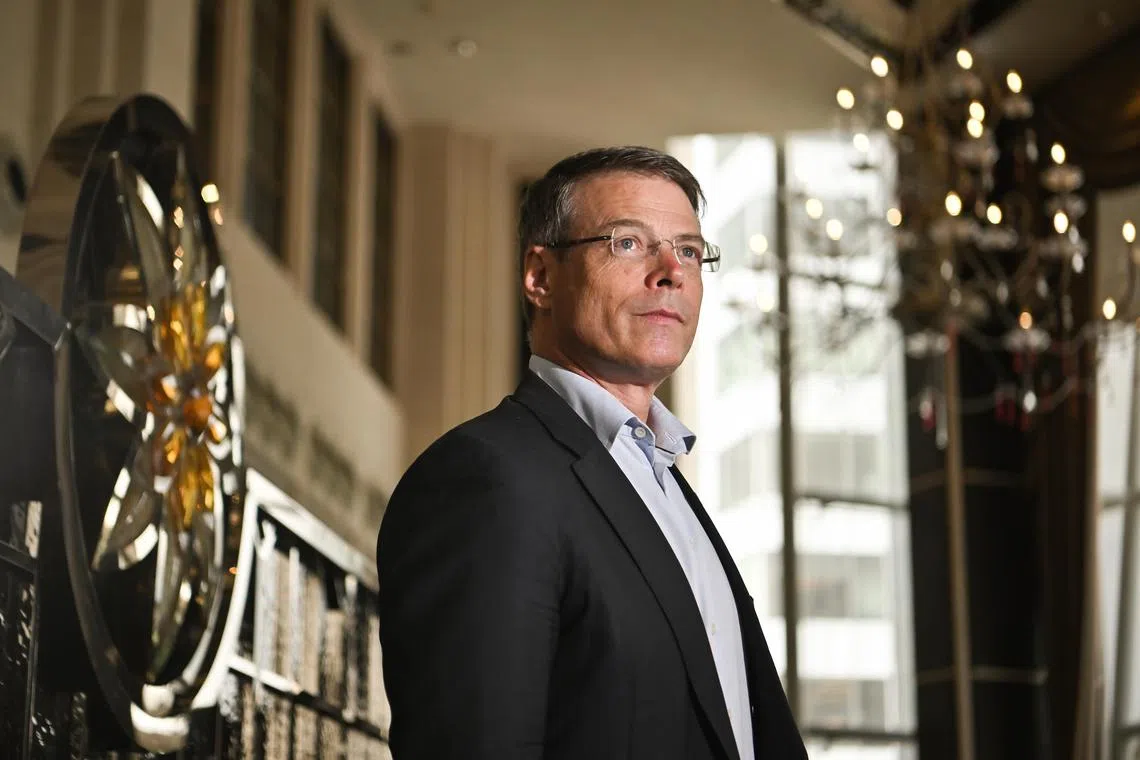Opportunities ahead as Singapore businesses eye trillions of dollars in green finance
Sign up now: Get ST's newsletters delivered to your inbox

This decade has been billed as a critical one for economies and businesses to achieve net-zero emissions and be nature-positive.
ST PHOTO: ALPHONSUS CHERN
Follow topic:
SINGAPORE – Companies involved with the expanding green economy are running red-hot these days, with trillions of dollars in financing up for grabs as the world pushes towards net zero.
New offices are opening here, and existing ones are expanding their services to meet demand, which includes strategic advice and asset management on climate investments, data analytics as well as software solutions from fintech companies.
The driving force for such high-octane activity partly comes from Singapore’s Green Plan 2030 reaching net-zero greenhouse gas emissions by 2050.
Industry insiders told The Straits Times that small and medium-sized enterprises (SMEs) typically seek help in assessing what ESG data needs to be measured and tracked, and how to properly report these findings.
As the acronym suggests, the ESG framework guides companies in three broad areas: their environmental impact, social issues and corporate governance.
There are many criteria for each category, but commonly recognised ones include measuring carbon footprints, supply-chain working conditions and diversity and inclusion matters related to policymaking and board members.
These are proving fertile fields for ESG software-as-a-service platform providers such as STACS and Seneca ESG, which have expanded their services or manpower to meet growing demand.
Such platforms generally collate information from a range of sources such as data providers, including Refinitiv and Bloomberg, and input from companies themselves, and then present it in a user-friendly interface with analytic tools to help users make sense of it all.
Corporations can use the data to monitor their carbon emissions, benchmark themselves against competitors or track and forecast their ESG progress.
“Sustainability reporting is usually a full-time office job, with a team of people doing nothing else but that. I think most companies don’t have such resources,” said Mr Benjamin Soh, the founder and managing director of STACS, which has a staff of 50.
The company has an ESG data registry – known as ESGpedia – that will be updated in May with more data coverage and various analytics tools to allow financial institutions to do portfolio monitoring, benchmarking and automated monitoring of certain companies.
Mr Soh added: “As SMEs play a pivotal role in greening the supply chain, STACS sought to digitalise corporate disclosure, and lower barriers to entry for SMEs to kickstart their sustainability journey.”
Other companies which are familiar with data collection and reporting tend to seek advice on other matters, such as goal-setting and practical steps that could reduce their carbon output or increase their ratings in the areas of social and governance.
Another group – financial institutions, venture capitalists and investors – requires tools to organise and make sense of the wealth of data so that better-informed decisions can be made on their portfolio according to their ESG goals and investment strategies.
Business intelligence company Seneca ESG boasts having more than 60 financial models built into its software.
Chief executive Jonathan Ha, who founded the company in 2020, calls it “situational-specific ESG”.
“We’ve created a solution for financial institutions to customise and design ESG-specific score points (because) they may have different product strategies, sector focus and so on, so they may have different scoring methodology for different situations.
“(ESG analysis is) not easy and is not one-size-fits-all, but it doesn’t mean it shouldn’t be done.”
There is more to climate reporting, of course.
Singapore-based fintech MVGX focuses on providing the technological infrastructure for ESG products and services. This includes infrastructure for carbon registries and exchanges, carbon measurement and management, and certification services.
The company uses big data and blockchain technology to ensure that every carbon credit can be tracked precisely from start to end to prevent double-counting, or the credits being used to aid in greenwashing.
MVGX founder Bo Bai said: “Some countries may not have established the infrastructure to deal with the nationality issue of carbon credits yet. So if somebody’s trying to sell you some carbon credits from Indonesia now, you might find that three years later, they are void... and your carbon-neutral effort is put to shame. People don’t talk enough about it.”
Accelerating Singapore’s green finance hub
Venture capitalist- and bank-backed initiatives such as SC Ventures and Studio 30 50 are also helping to drive momentum in the sector by funding tech-based ESG solutions, further cementing Singapore’s position as a green hub.
Studio 30 50 was launched in April by companies with a stake in the maritime industry – Hafnia, Wilhelmsen and DNV – alongside corporate venture capital firm IMC Ventures and Microsoft as its principal innovation partners.
It aims to crowdsource and fund tech-driven ESG solutions for the maritime industry and commercialise these initiatives.
Mr Harald Eltvedt, who focuses on venture building and sustainability at SC Ventures, the corporate venture capital and incubator arm of Standard Chartered Bank, said the issue of sustainability in venture capital investments has “dramatically increased in the past two to three years”.
He noted that 25 per cent of the undertakings SC Ventures incubated in 2022 were sustainability-linked projects and initiatives. SC Ventures has around a dozen ventures based here, and three more sustainability-related ones will be launched later in 2023.
“We see Singapore as a hub for this whole region, to abide by specific frameworks. And I think Singapore can be the place where the frameworks are being originated” and then adopted by other countries in the region, he added.
“That’s what we’re seeing and that’s why we’re putting a lot of focus on Singapore.”
Ms Tina Thomas, who is head of ESG at BoardRoom Group, said Singapore has been “quick to adapt to the increasing pressures on sustainability matters and has adopted measures to make sustainability a priority for businesses”.
“Although ESG has been a topic widely discussed globally for more than a decade, Singapore, over the last couple of years, has taken on a very proactive approach in improving the readiness of the economy to transition, compared to other mature markets,” she added.
In 2021, Enterprise Singapore launched the $180 million Enterprise Sustainability Programme to help local firms go green by providing training workshops, project support and financing.
The BoardRoom Group, which offers corporate services to businesses and has been advising clients on “governance” aspects of sustainability matters since 2020, established its full-fledged ESG business unit in 2022 due to the increasing demand.
The opportunities for businesses here are immense. A 2021 report by UBS estimated US$140 trillion (S$187 trillion) will be needed to decarbonise the world’s energy supply to reach the 2050 commitments of the Paris Climate Agreement.
This decade has been billed as a critical one for economies and businesses to achieve net-zero emissions and be nature-positive, which goes beyond being just carbon-neutral to actively working to restore and repair the environment.
Singapore’s key role in global supply chains and its geographical location as a regional trade hub make it well positioned to capitalise on this opportunity.
Mr Patrick Suckling, Asia managing director of Pollination, a global climate-change advisory and investment firm, said: “People don’t talk about billions any more, they talk about trillions, and Singapore is really well positioned to capitalise on the transition.”

Mr Patrick Suckling, Asia managing director of global climate-change advisory and investment firm Pollination.
ST PHOTO: LIM YAOHUI
Pollination plans to open its Asia headquarters here later in 2023, “in response to strong interest we are seeing for Pollination’s services in Singapore, as well as increasingly across South and South-east Asia”, he noted.
“Singapore is in pole position, whether it’s through the trading systems, through the financial centre that Singapore has, whether it’s developing new technologies, new businesses, new markets like carbon markets... there are just all sorts of extraordinary opportunities,” he added.


